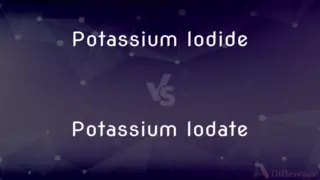Cloud Computing vs. Distributed Computing — What's the Difference?
By Tayyaba Rehman — Published on November 14, 2023
Cloud Computing offers computing resources via the internet, while Distributed Computing divides tasks across multiple computers to solve a single problem.

Difference Between Cloud Computing and Distributed Computing
Table of Contents
ADVERTISEMENT
Key Differences
Cloud Computing is a model where computing resources such as servers, storage, and applications are provided to users over the internet. Users can access these resources on-demand without the need to own or maintain the physical infrastructure. Distributed Computing, on the other hand, involves splitting a computational problem into smaller tasks that run simultaneously on multiple computers, working collaboratively to solve the problem.
In Cloud Computing, service providers offer resources on a pay-as-you-go or subscription basis, enabling scalability without upfront costs. Distributed Computing doesn't necessarily rely on the internet; it focuses on distributing a task for parallel processing to achieve faster results or handle larger datasets.
Cloud Computing typically leverages vast data centers equipped with a myriad of powerful servers. These data centers can be located anywhere in the world, ensuring high availability and redundancy. In Distributed Computing, the participating machines, also called nodes, might belong to one entity or be part of a larger, collaborative network like the SETI@home project.
For businesses, Cloud Computing offers flexibility, enabling them to scale resources based on demand. This means they can use more resources during peak times and reduce them during off-peak times. Distributed Computing, conversely, offers the ability to process vast amounts of data or complex calculations by leveraging the collective power of multiple computers.
Comparison Chart
Primary Purpose
Providing computing resources via the internet
Dividing tasks across multiple computers to solve a problem
ADVERTISEMENT
Cost Model
Pay-as-you-go or subscription
Not inherently tied to a payment model
Dependence on Internet
Typically relies on the internet
Doesn't necessarily require internet
Typical Use Cases
Web hosting, data storage, software as a service
Scientific research, large-scale data processing
Infrastructure Ownership
Managed by third-party providers; users don't need to own hardware
Nodes may belong to one entity or multiple entities collaborating on a common task
Compare with Definitions
Cloud Computing
Virtualized computing resources offered by third-party providers.
By leveraging Cloud Computing, developers could deploy their applications without buying physical servers.
Distributed Computing
Breaking a computational problem into smaller parts for parallel execution.
Through Distributed Computing, the team solved complex simulations by distributing them across several computers.
Cloud Computing
A model for renting IT resources on a pay-as-you-go basis.
Cloud Computing eliminates the need for businesses to invest heavily in IT infrastructure.
Distributed Computing
Networking computers to work collaboratively on a single problem.
Distributed Computing techniques were integral to the success of the large-scale astronomy project.
Cloud Computing
On-demand access to shared computing resources.
Cloud Computing ensures that startups can scale up their IT needs based on demand.
Distributed Computing
A system where multiple computers collaborate to solve a single task.
With Distributed Computing, the research institute processed huge datasets in record time.
Cloud Computing
The delivery of computing services over the internet.
With Cloud Computing, businesses can access software applications without installations on local machines.
Distributed Computing
Using multiple machines to achieve faster computation or data processing.
Distributed Computing allowed the company to handle large-scale data analytics more efficiently.
Cloud Computing
Remote servers hosted on the internet to process, store, and manage data.
Using Cloud Computing, the company centralized its data storage, making it accessible from any location.
Distributed Computing
Leveraging the combined power of multiple nodes for complex tasks.
To predict the weather patterns accurately, meteorologists used Distributed Computing systems.
Common Curiosities
What defines Distributed Computing?
Distributed Computing involves dividing a single task across multiple computers to be processed simultaneously.
Is Cloud Computing always distributed?
Not necessarily. While Cloud Computing can use distributed architectures, they don't always equate.
Why do companies use Cloud Computing?
Companies use Cloud Computing for flexibility, scalability, cost-efficiency, and accessing advanced technologies without infrastructure investment.
What is Cloud Computing?
Cloud Computing provides computing resources, like servers and storage, over the internet on an on-demand basis.
What are some common applications of Distributed Computing?
Distributed Computing is often used in scientific research, large-scale data analytics, and complex simulations.
Can Distributed Computing work offline?
Yes, Distributed Computing can operate offline, as long as the networked computers can communicate.
How does Distributed Computing enhance performance?
Distributed Computing increases performance by processing parts of a task simultaneously across multiple computers.
Are there any downsides to Cloud Computing?
Potential downsides include data security concerns, potential downtime, and dependency on service providers.
How do computers in Distributed Computing communicate?
In Distributed Computing, computers communicate using defined protocols over a network.
Is Cloud Computing secure?
While Cloud Computing providers offer security measures, users must also implement best practices to ensure data security.
Can anyone access Cloud Computing services?
Many Cloud Computing services are available to the public, but access typically requires registration and may incur costs.
How does Cloud Computing impact IT costs?
Cloud Computing can reduce costs by eliminating the need for physical infrastructure investment and maintenance.
Do I need specialized hardware for Distributed Computing?
Not always. Distributed Computing can be achieved with standard computers networked together.
Is Distributed Computing the same as parallel computing?
While related, they're not the same. Parallel computing refers specifically to simultaneous processing, while Distributed Computing emphasizes distribution across multiple machines.
How do I know if my business should adopt Cloud Computing or Distributed Computing?
The decision depends on business needs. Cloud Computing offers flexibility and scalability, while Distributed Computing is optimal for specific, large-scale computational tasks.
Share Your Discovery

Previous Comparison
Potassium Iodide vs. Potassium Iodate
Next Comparison
Fruit Cake vs. Christmas PuddingAuthor Spotlight
Written by
Tayyaba RehmanTayyaba Rehman is a distinguished writer, currently serving as a primary contributor to askdifference.com. As a researcher in semantics and etymology, Tayyaba's passion for the complexity of languages and their distinctions has found a perfect home on the platform. Tayyaba delves into the intricacies of language, distinguishing between commonly confused words and phrases, thereby providing clarity for readers worldwide.
















































